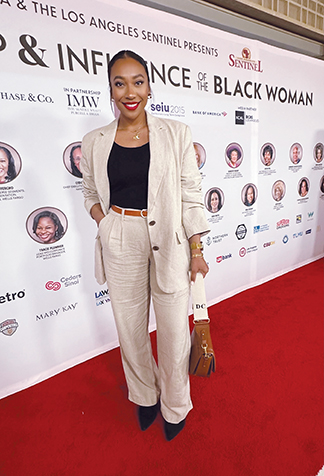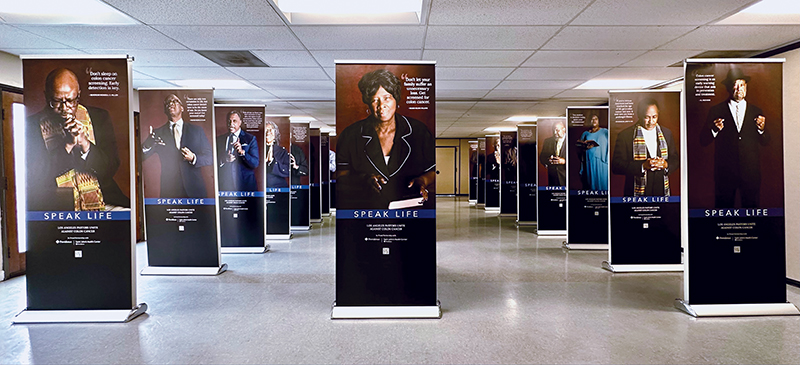LOS ANGELES — Denise Colomé is the director of health equity for Providence St. Joseph Health in California's south division. She grew up in Boyle Heights, a neighborhood in east Los Angeles known as a historical hub for various minority groups.
Her father, an immigrant from the Dominican Republic, had a career as a professional boxer and trainer. Her mother, who immigrated from Mexico, worked in hospitality at the University of Southern California. That's where Colomé got her bachelor's in communication and sociology and her master's in communication management with an emphasis in health and social change.
 Denise Colomé
Denise Colomé
Her job is to look over disparity issues identified through race and ethnicity data and figure out ways to mitigate the disparities through specialty programs or interventions.
Colomé spoke to Catholic Health World about her background and approach to her work. Responses have been edited for length and clarity.
How did your upbringing affect what you wanted to do?
My mother worked in hospitality most of my life, which is how I was exposed to USC. I was able to go on campus and visit her, spend time there and really understand how hard it could be for immigrant workers to not only find jobs but to access resources in this country. I think that stems from my need, desire and passion to be an advocate. Sometimes we struggled to put food on the table, but other times, you know, (my father) would get a door knock, and it was Oscar De La Hoya asking him if he could come train him for his next match. So my childhood was very interesting, and that experience definitely impacted me in different ways.
How did your studies affect what you wanted to do?
I knew that I wanted to ensure that there were campaigns that I could do to help ensure that communities of color were aware of the chronic conditions that were impacting their health. I also wanted to ensure that the social determinants of health as we know them were understood by the average community member: making sure that we are simplifying some medical terminology for communities that are non-English speaking and making sure that we have resources in place for them to access.
How have you built on what Providence has already been doing?
During the COVID-19 pandemic, we stratified our data by race and ethnicity, and one of the top disparities we saw impacting most California patients was hypertension. And so, we started there, we partnered with the American Heart Association and other community-based organizations that would partner with churches, because at the time, everything was kind of shut down. In-person gatherings weren't happening. We had to think creatively of how we were going to reach the community.
With the help of some physician champions, we were able to come up with a program that funded blood pressure monitors that had the Bluetooth capacity and Wi-Fi capacity to render their numbers remotely from home. We did virtual support groups through the American Heart Association. These support groups were intended to meet the community where they were in a virtual telehealth setting to access our providers and access educational material on what they can do from home that will increase their self-efficacy, and to ensure that they were equipped with the resources within their home that can render what their numbers were reading.
The pilot program showed us some of the best practices that we can scale and expand to other ministries, which is our hospitals. It started off first as a program across Southern California ministries, we were then able to revamp it, take the challenges and the wins from it, and convert those into best practices, some of those being (establishing) the support groups.
As things started opening back up, we physically went to the churches. The church leaders were really on board and supportive, because we built relationships with them. And I think that really started to tackle some of the historical mistrust within some of the pockets of the city. It ended up moving the needle. And so we said, Why stop there? Let's scale this program to northern California ministries and see how we can take the same approach. Thankfully, it has worked.
What else have you tried that is working?
We also set up another program focusing on increasing colorectal cancer screenings within communities of color, because they dropped to an all-time low during the pandemic. We started identifying an entire year's worth of events where we can meet the community where they are to offer them education around colon cancer and how it was impacting communities of color at prevalent rates, ensuring that those that were uninsured, especially some who were undocumented, that these resources were made available to them. Providence Saint John's (Health Center in Santa Monica, California) sponsored and funded the grant, alongside (cancer research support nonprofit) Stand Up To Cancer. That (collaboration) facilitated our ability to hire community health workers in the ZIP codes that were at the highest need.

The Speak Life campaign, a partnership with Providence Saint John's Health Center in Santa Monica, California, and pastors at local churches, urged colon cancer awareness in the Black community.
We spoke again with our partnering churches and church leaders and said, Can you speak from the podium and let them know how important this is, how we're dying? So we stood up a campaign called Speak Life, and it came to fruition in life-sized posters of each of the 30-plus church leaders. We took a portrait of them and a small quote and were able to put that up as an exhibition to create some chatter about what our goal was. We sent and deployed our community health workers into those ZIP codes to offer the resources directly to them. We did a screener, and once we determined eligibility, were able to send them a FIT (colon cancer screening) kit.
Other people have noticed this work, and researchers have been honored for it.
Yes, we have received a lot of interest from other organizations. Now we're having discussions with the American Cancer Society of ways that we can utilize students to be able to help navigate this as well. I think the biggest thing that it brought for us was the trust from the community that we were able to build with both small and larger community-based organizations, such as churches with large congregations. I think for us, that's one of the biggest wins — to be able to just go into places of the city that have been undeserved historically and do some good.
People probably don't realize what has to happen on your end first.
There's a little bit of disconnect being that in health care we can sometimes operate in silos, right? And this is not only here. It's easy to fall into silos because of how matrixed organizations in health care are, while ensuring that we are collaborating in the right way with other departments. Ultimately, we are all contributing to how we show up for our patients and our communities and ensuring that they have the best experience from the time that they make the phone call to the time they walk through the hospital (doors), etcetera. I think that is a lot easier said than done. It takes a lot of time and resources to collaborate effectively. The collaboration will set up the communication for success.
How does being a Catholic institution affect how you approach your work and caring for the common good?
It can be a little challenging. Specifically, we as health care providers in general, whether it's Catholic or not, we have to debunk and unpack some of the historical mistrust that is in place in certain communities, specifically communities of color, who have been historically marginalized or oppressed.
It shouldn't change your approach. Because care is care, right? You should be providing quality care to everybody. But I think from a health equity lens, you need to understand that quality is not just giving everybody the same of everything, because some people's needs are specific and unique. Health equity is giving people what they specifically need to ensure there is quality of care.